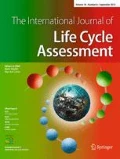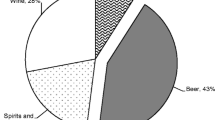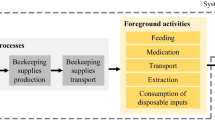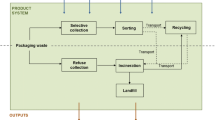Abstract
Background, Aim and Scope
The increasing concern about environment protection and a broader awareness of the sustainable development issues cause more and more attention to be given to the environmental impacts of products through the different phases of their life cycle. Foods are definitely among the products whose overall environmental performance can be effectively investigated resorting to LCA. A LCA case study was performed in order to detect and quantify the environmental impacts deriving from the life cycle of a lager beer produced by an Italian small brewery, investigating and comparing two packaging options: beer in 20 L returnable stainless steel kegs and beer in 33 cL one way glass bottles.
Materials and Methods
The investigated system included: production and acquisition of materials and energy, brewing process, packaging, transports, beer consumption and waste disposal. Data for the study were mostly collected from the Theresianer Brewery and completed on the basis of literature information. Data uncertainty was treated with a Monte Carlo analysis. Life Cycle Inventories were constructed for 1 L of beer in bottle and 1 L of beer in keg using the LCA software SimaPro and then assessed at the endpoint level according to the Eco-Indicator’99 method.
Results
Inorganic emissions, land use and fossil fuel consumptions resulted to be the most critical environmental issues of both beer life cycles. Beer in keg turned out to cause a lower environmental load along its life cycle than bottled beer; this was mainly due to the higher emissions and the higher energy consumptions allocated to the glass bottles. Moreover, beer consumption phase, glass bottle production and barley cultivation were found to be the critical stages of the beer life cycle.
Discussion
The brewing process did not result as a critical stage and therefore the company dimension may not be a crucial element for the overall impact quantification. On the contrary, beer consumption may have a significant impact mainly due to the consumer displacement.
Conclusions
The analysis pointed out the relevance of the beer consumption phase and of the packaging choice within the beer life cycle and allowed to detect the other critical stages of the life cycle. It is worth to notice that producers and consumers can be active and responsible actors in pursuing the collective goal of the environmental sustainability.
Recommendations and Perspectives
In order to improve the environmental performance of the beer life cycle, producers should set up marketing strategies in favour of reusable packaging and consumers should prefer draught beer and reduce car use. As beer consumption phase, bottle production and recycling and barley cultivation were found to be very significant stages of the life cycle of the beer, deepening the analysis of these aspects in similar studies is suggested.
Similar content being viewed by others
References
Andersson K, Ohlsson T (1999): Life Cycle Assessment of Bread Produced on Different Scales. Int J LCA 4(1) 25–40
Andersson K (2000): LCA of Food Products and Production Systems. Int J LCA 5(4) 239–248
Jungbluth N, Tietje O; Scholz RW (2000): Food Purchases: Impacts from the Consumers’ Point of View Investigated with a Modular LCA. Int J LCA 5(3) 134–142
Høgaas Eide M (2002): Life Cycle Assessment (LCA) of Industrial Milk Production. Int J LCA 7(2) 115–126
Ziegler F, Nilsson P, Mattsson B, Walther Y (2003): Life Cycle Assessment of Frozen Cod Fillets Including Fishery-Specific Environmental Impacts. Int J LCA 8(1) 39–47
Ramjeawon T (2004): Life Cycle Assessment of Cane-Sugar on the Island of Mauritius. Int J LCA 9(4) 254–260
Brauwelt: Hans Carl Publishing, Andernacherstrasse 33 A, 90411 Nuernberg, Germany
Brewers Guardian: Advantage Publishing, Lyttel Hall, Coopers Hill Road, Nutfield, Redhill, RH1 4 HY, UK
Technical Quarterly Master Brewers Associations: 3340 Pilot Knob Road, St. Paul, Minnesota 55121-2097 (USA)
Birra e Malto: AITB, Via Trento 79, 32034 Pedavena, Italy
Talve S (2001): Life Cycle Assessment of a Basic Lager Beer. Int J LCA 6(5) 293–298
Koroneos C, Roumbas G, Gabari Z, Papagiannidou E, Moussiopulos N (2005): Life cycle assessment of beer production in Greece, Journal of Cleaner Production 13, 433–439
Takamoto Y, Mitani Y, Takashio M, Itoi K, Muroyama K (2004): Life Cycle Inventory Analysis of a Beer Production Process. MBAA TQ, Vol 41, No 4, 363–365
Bare JC, Hofstetter P, Pennington DW, Udo de Haes HA (2000): Midpoints versus Endpoints: The Sacrifices and Benefits. Int J LCA 5(6) 319–326
Pre (2001): The Eco-Indicator 99, A damage oriented method for Life Cycle Impact Assessment — Methodology Report 〈http://www.pre.nl〉
Lewis MJ, Young TW (1998): Brewing, Chapman & Hall Springer
Narziss L (1976): Die Technologie der Malzbereitung, 6th ed, Enke Stoccarda
Brewing Techniques. 〈http://www.brewingtechniques.com〉
Ecoinvent 〈http://www.ecoinvent.ch〉
ETH-ESU 96 〈http://www.pre.nl〉
BUWAL 250 〈http://www.umwelt-schweiz.ch/buwal/eng/index.html〉
Frischknecht R (2002): Land occupation and land transformation in life cycle inventories. SETAC Europe Annual Meeting, May 13, 2002
Pre (2004): SimaPro6 — Introduction to LCA 〈http://www.pre.nl〉
Thompson M, Ellis R, Widavsky A (1990): Cultural Theory, Westview Print Boulder
Author information
Authors and Affiliations
Corresponding author
Additional information
ESS-Submission Editor: Dr. Rolf Frischknecht (frischknecht@ecoinvent.org)
Rights and permissions
About this article
Cite this article
Cordella, M., Tugnoli, A., Spadoni, G. et al. LCA of an Italian lager beer. Int J Life Cycle Assess 13, 133–139 (2008). https://doi.org/10.1065/lca2007.02.306
Received:
Accepted:
Published:
Issue Date:
DOI: https://doi.org/10.1065/lca2007.02.306




